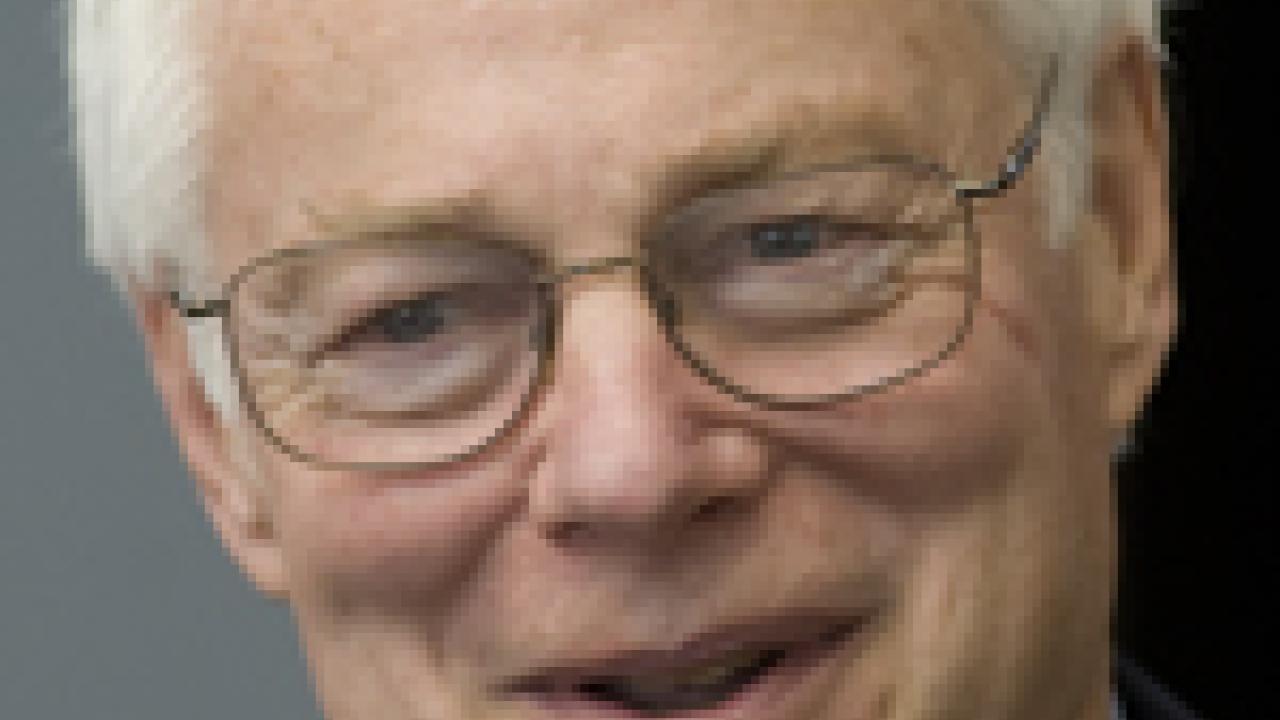In this era of Internet blasts and feisty town hall meetings, Jim Leach is putting out a courageous call for tempered talk and civil behavior.
“There are few greater threats to civilization than intolerance,” said Leach, chairman of the National Endowment for the Humanities, during an April 8 talk on campus as part of the 50-state “civility tour” that he launched last November. UC Davis Chancellor Linda Katehi invited him to speak in the new Chancellor's Colloquium series.
Leach’s talk, “Civility in a Fractured Society,” came at an important time for a campus that has witnessed several acts of intolerance in recent weeks, even while it was preparing to celebrate the 20th anniversary of its Principles of Community.
Addressing a Freeborn Hall audience of more than 250, Leach supported the chancellor’s call for a “hate-free campus” and said the university is taking “these acts of vandalism with incredible seriousness.”
Two swastikas turned up in residence halls — one carved into the door of a Jewish student’s room, another etched into a bulletin board — and four more showed up in spray paint elsewhere on campus. A graffiti attack left words like “homos,” “fags” and “queers” in spray paint at the entrance to the Lesbian, Gay, Bisexual, Transgender Resource Center.
Those angry acts, Leach said, reflect more than just bigotry toward the people directly targeted — they also reveal a dangerous “ignorance” of the facts of history and could be early warning signs of larger-scale cruelty and even despotism.
“There is a great deal of clarity about the Holocaust,” said Leach, who served 30 years in Congress as a representative from Iowa. He said he is concerned about Holocaust “deniers” who ignore the “incontrovertible evidence” that Adolf Hitler’s Germany killed more than 6 million Jews.
Intolerance can arise anytime
In America today, Leach finds worrisome the rise of armed militia guided by racial and fundamentalist beliefs.
“It is self-evident that fear of differences is a weakness of the human condition,” he said.
While it may be hard to imagine, Leach said, no nation is immune from the tyranny of hate if it grows unchecked.
“A great civilization in a very short time can decay,” he said, citing the decline of Athenian democracy into dictatorship and the fall of an advanced culture like 1920s Germany into Nazism. “We all lose when hatred and extremism act out.”
When the rhetoric turns hateful, Leach said, violence is not far behind.
And so, “it is important we pay attention to words,” he said, especially to new ones that pop up in political dialogue, like “secession” or “nullification,” which take aim at the legitimacy of the federal government. “When you use warring words, they have political implications.”
Leach is critical of a political system that, by creating so many safe, one-party seats through partisan redistricting, has produced strong incentives for politicians in both parties to drift far from the center. “We have a system that causes good people to follow the low road.”
‘Citizenship is difficult’
Uncivil behavior is nothing new for Leach, who in August 2009 began his leadership of the NEH, which supports the creative efforts of scholars, publishers, artists, filmmakers and writers. Early in his career, Leach, a moderate Republican, was a Foreign Service officer in the State Department, resigning in protest the evening of the Saturday Night Massacre in 1973, when then-President Nixon fired Archibald Cox, special prosecutor in the Watergate investigation.
Looking back on it all, Leach acknowledges that “citizenship is difficult” and democracy is time-consuming, full of debate and thinking.
“Democracy is rooted in argumentation, which is a profound social good. It’s the way we guard against tyranny and dogmatism,” he said, citing 19th-century poet Walt Whitman’s description of America as an “athletic democracy” with a free-spirited appetite for debate.
While changes are difficult for many people, it harms debate when people assume morality is on their side. “That makes the other person immoral,” he said.
Politics of sportsmanship
Leach, a three-sport athlete at Princeton University and a member of the national and international wrestling halls of fame, believes that profound analogies exist between politics and sports. The sportswriter Grantland Rice had it right 75 years ago when he observed that winning and losing are less important than how the game is played. The same kind of sportsmanship and respect for one’s opponents is healthy in politics, Leach added.
“Sometimes it is better to say nothing. One doesn’t always need to respond,” he said.
Leach described the most profound political science observation of the 20th century as Albert Einstein’s suggestion that splitting the atom had “changed everything except our way of thinking.”
He is concerned that a proliferation of media options on the Web and cable TV, while positive in many aspects, actually harden and narrow existing attitudes. People must learn to listen respectfully to other points of view, he explained.
Chancellor Katehi, in introducing Leach, said his topic could not be more timely for the campus and that his wisdom would be well-received. She noted how the university had quickly rallied against the recent hate acts.
“We came together to denounce the hatred and to commit ourselves to positive change,” said Katehi, adding that everyone deserves a safe and respectful UC Davis environment.
“Without that very basic guarantee, we cannot be the campus we aspire to be,” the chancellor said.
On the Net
Video of Leach’s speech: dateline.ucdavis.edu
Principles of Community: principles.ucdavis.edu
Media Resources
Clifton B. Parker, Dateline, (530) 752-1932, cparker@ucdavis.edu
